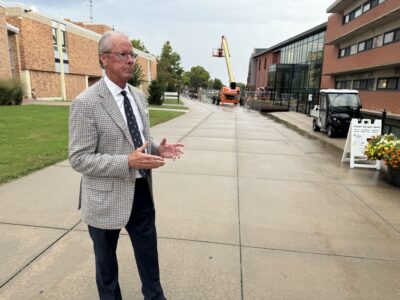Smoking ban benefits come swiftly
Research is backing up what health professionals have long thought was true: Smoking bans are heart healthy.
A new study at Kansas University found that smoking bans reduce the number of heart attacks each year by as much as 26 percent.
“The effect of smoke on heart attacks is huge,” said David Meyers, professor of cardiology and preventive medicine at Kansas University Medical Center and lead investigator of the study. “Even breathing in low doses of cigarette smoke can increase one’s risk of heart attack.”
Meyers estimated that a nationwide ban on public smoking could prevent as many as 154,000 heart attacks each year. Nonsmokers would benefit by limiting their exposure to secondhand smoke. Smokers would have a greater incentive to quit or cut back.
These findings are particularly important in light of mounting evidence that secondhand smoke exposure is nearly as harmful as smoking. Direct smoking doubles the risk of heart attack, while secondhand smoke increases the risk by 30 percent. According to the Kansas Department of Health and Environment, 400 Kansans die each year as a result of secondhand smoke inhalation.
Immediate benefits
The KU study also found that smoking bans have immediate benefits, with declines in reported heart attack cases within three months.
“Within minutes of the ban, it is going to start having an effect on heart attacks,” Meyers said.
Heart attacks are being used as a measuring stick — instead of lung cancer and emphysema, for example — because they don’t take years of exposure to develop.
“Heart attacks are caused in large part by blood clots,” Meyers said. “With 20 minutes or so of tobacco smoke exposure, people’s blood becomes hypercoagulable and sticky and clots easily, and bam, you have a heart attack.”
Mounting evidence
The study, which Meyers did with colleagues John Neuberger and Jianghua He, is in Tuesday’s Journal of the American College of Cardiology.
Another study on smoking bans was recently published in the American Heart Association’s journal Circulation and was done by researchers at the University of California, San Francisco. They looked at much of the same data and came to the same conclusions.
Collectively, the studies involved 24 million people and looked at 11 geographic areas, including Helena, Mont.; Pueblo, Colo.; Saskatoon, Canada; and Rome, Italy. The observations of the effect of the bans ranged from two months to three years.
Meyers said the research should put to rest the debate and doubts that persist about the health benefits of smoking bans.
“There is no way — absolutely no way — with 24 million people over three years that we are being fooled by statistics.” Meyers said. “The argument — that this is bad science — has now been put definitively to rest.”
With such mounting evidence, he hopes Kansas soon will join the 32 states that have enacted smoking bans in public and workplaces. In fact, he would like to see a uniform, nationwide ban to make it fair for everyone, especially for businesses that are on state borders such as in the Kansas City area.
“I am a restaurant groupie, so I know a lot of the owners, and it is not unreasonable for them to argue if I don’t have smoking in my restaurant and so and so down the street does, the smokers are going to go there and I am going to lose business. That’s not an unreasonable argument,” Meyers said.
“What needs to happen is there needs to be a widespread, uniform ban so that it is fair. Now, I am truly embarrassed that big-time smoking countries like Ireland, Scotland, France and Italy have had the political will to have national smoking bans that work. What’s wrong with us?”
While it likely won’t happen at the national level, there will be a strong push for a statewide ban in Kansas during the next legislative session.
“My administration will fully support, and promote, a meaningful statewide smoking ban,” Gov. Mark Parkinson said. “The ultimate goal of our efforts is simple — reduce rates of cancer and tobacco-related diseases among Kansans.”
He said as more and more Kansans learn about the benefits of the legislation, the issue has gained significant support and momentum.
“A few years ago, the Clean Indoor Air Act couldn’t get the votes it needed to be passed out of a committee,” Parkinson said. “Last year, the act passed the Senate Chamber, and we will make a significant push to continue that success this session in the House.”
According to a 2007 Kansas Adult Tobacco Survey, 71 percent of voters favor a statewide smoke-free law, and nearly one-third of voters who smoke support the same law.
State leader
Five years ago, Lawrence was among the first cities in Kansas to pass a smoking ban. Lawrence resident David Dunfield helped lead the way by appointing a special task force to look into the issue as mayor and then voting for the ban as a city commissioner.
“I have never regretted it for a minute. It’s a public health issue, and that’s why we took it on,” Dunfield said. “As more research comes in, it just continues to validate what we did.”
Dr. Steven Bruner, of Lawrence Family Medicine and Obstetrics, also was a proponent of the smoking ban and has learned the benefits are much higher than he previously suspected.
He said when he first read about research done in Helena, Mont., that linked the reduction in heart attacks to a smoking ban, he thought the statistics were astonishing and maybe some kind of fluke.
“But now it has been studied in different places, and they all show the same thing. After a while, you have to believe it’s real,” he said.
Meyers and the KDHE said tracking the health benefits regarding Lawrence’s smoking ban would be extremely difficult because there are too many people who commute to and from area towns that do not have smoking bans. There also are 30,000 students at Kansas University.
“Unlike Pueblo, Colorado, you just do not have a little closed community,” said Candace Ayars, director of tobacco use prevention program at KDHE.
But Meyers doesn’t doubt for a second that Lawrence’s ban has made a great impact.
“The studies would suggest that, yes, it is saving lives. You guys are outstanding.”







